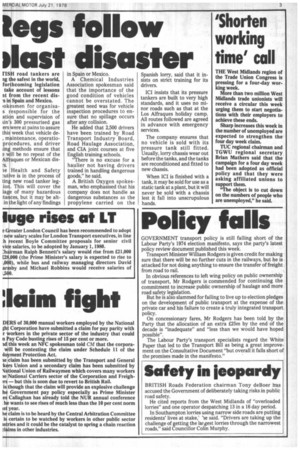l egs follow
Page 5

If you've noticed an error in this article please click here to report it so we can fix it.
'last disaster
ris road tankers are e safest in the world, for hcoming legislation e account of lessons it rom the recent disi Spain and Mexico. ok smen for organisaesponsible for the ati n and supervision of tin' 300 pressurised gas ers ere at pains to assure thi week that vehicle de , intenance, operatiopr cedures, and driver in methods ensure that ill be no repeat of the Alf agues or Mexican disrs.
Health and Safety :tut e is in the process of tin new road tanker leglo . This will cover the ia of many hazardous Ia ces, but it may be altin he light of any findings in Spain or Mexico.
A Chemical Industries Association spokesman said that the importance of the good condition of vehicles cannot be overstated. The greatest need was for vehicle inspection procedures to ensure that no spillage occurs after any collision.
He added that 2,500 drivers have been trained by Road Transport Industry Board, Road Haulage Association, and CIA joint courses at five English training schools.
"There is no excuse for a haulier not having drivers trained in handling dangerous goods," he said.
A British Oxygen spokesman, who emphasised that his company does not handle as dangerous substances as the propylene carried on the Spanish lorry, said that it insists on strict training for its drivers.
ICI insists that its pressure tankers are built to very high standards, and it uses no minor roads such as that at the Los Alfraques holiday camp. All routes followed are agreed in advance with emergency services.
The company ensures that no vehicle is sold with its pressure tank still fitted. Usually, lorry chassis wear out before the tanks, and the tanks are reconditioned and fitted to new chassis.
When ICI is finished with a tank, it may be sold for use as a static tank at a plant, but it will never be sold with a chassis lest it fall into unscrupulous hands.




































































































